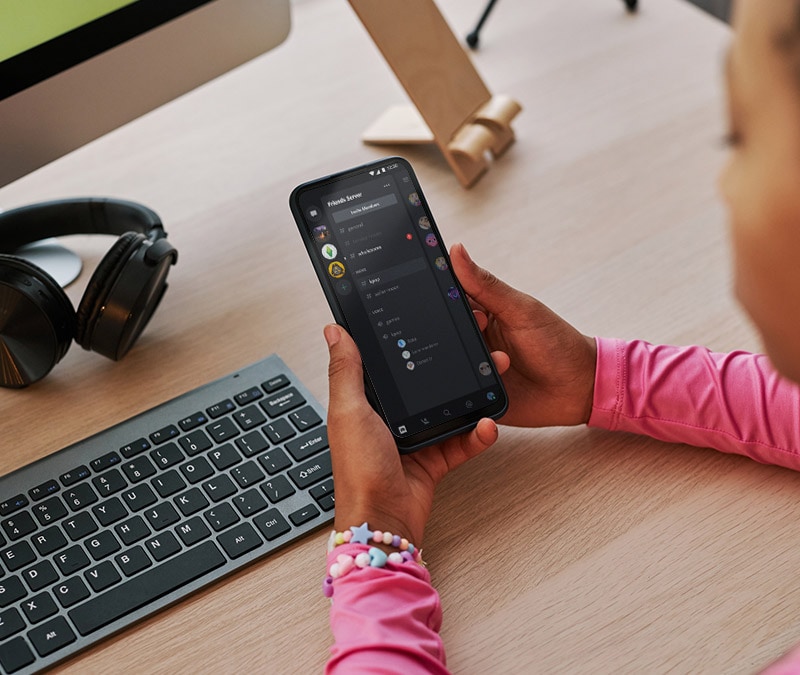Should kids have cellphones?
88% of teens own or have access to a cellphone or smartphone. Parents are grappling with some of the downsides of their children being constantly distracted by technology. Consider your own kid’s maturity level and how they will use the cellphone.

As kids become more independent, cellphones are a great way to reach them on the go. After all, you can’t beat getting real-time updates on their whereabouts and schedule changes. But should kids have cellphones? For most parents, it’s not all about age. You’ll also need to consider your own kid’s maturity level, how your child will use the cellphone, and the potential drawbacks involved.
What are the benefits of kids having cellphones?
Getting a cellphone, or a smartphone, has become a milestone for many kids, allowing them to fit in with their classmates and build trust with their parents through frequent communication.
As far as safety goes, smartphones are helpful in emergencies and can even help you locate your child using the GPS function. The safety element is especially appropriate for teens who drive, but there’s an argument for younger kids to get their own device, too. Keeping pace with technology helps kids stay competitive in an increasingly connected society. And as your kid may have pointed out, your cellphone data plan probably accommodates a few extra lines.
Those are some of the main reasons parents buy their kids cellphones, according to Nielsen’s Fourth Quarter 2016 Mobile Kids Report report. And according to a 2015 Pew Research Center study, some 88 percent of teens own or have access to a cellphone or smartphone.
The drawbacks of children owning cellphones
Now that so many kids and teens are carrying smartphones, families are grappling with some of the downsides of being constantly distracted by technology. Here are three of them.
1. Health concerns
As if it wasn’t hard enough to get your kid to bed, cellphones are contributing to the problem. Studies have found a considerable link between using smartphones and getting less sleep in the teen demographic. Teens who don’t sleep enough may perform poorly in school and are at higher risk of obesity. In a 2014 study, 80 percent of teens said they use their phones when they’re supposed to be sleeping.
Radiation is another health concern. Cellphones work by using radio waves, which is a form of radiation. So whether you’re holding your device to your ear or sleeping with it near your head, your body may be absorbing this energy, according to the National Cancer Institute. However, research still hasn’t definitively linked this exposure to health problems in children and teenagers, according to the U.S. Food & Drug Administration. To offset potential effects, use the speaker mode or a headset — or simply use your phone less, the FDA says.
2. Safety concerns
The internet can be a great tool for education and communication, but it can also be a dangerous place. Giving your child a smartphone means giving them access to the internet and social media platforms. This could make them more susceptible to internet predators and cyberbullying. Other threats include age-inappropriate content, hate speech, and scams.
Teens with a cellphone and set of car keys deal can represent another safety concern: talking and driving. Researchers have found that cell-phone use can increase the odds of being in an auto accident by four times — a risk comparable to that of driving impaired, according to the American Psychological Association. Further, nearly a third of all traffic accidents involve drivers who are texting or talking on a phone, according to data published in 2015 by the National Safety Council.
3. Chance of losing or breaking the device
The average smartphone cost in North America is nearly $600. Putting that device in your kid’s hands means trusting them with an expensive piece of equipment. For young kids, if you’re spending this much money for a cell phone, it may be smart to consider adding cellphone insurance to your payment plan.
4. Full access to the internet and all potentially risky content
A smartphone may give your kid access to just about everything on the internet. That may include graphic, disturbing, or illegal content. Even a mainstream news site could broadcast coverage which may not be age appropriate for your child. A smartphone also comes with the possibility that your child may click on a link that downloads malware onto the device. If you give your child a smartphone, it’s a good idea to provide guidelines and advice on how to help avoid some of the risks. It’s also wise to install mobile device protection for Android or iOS phone.
Should I buy my child a smartphone?
If you think your kid should have a cellphone, the first choice you’ll have to make is whether to get a smartphone or a basic mobile phone without a data plan or internet connectivity.
Weigh the pros of a smartphone — like a high-quality camera and photo-editing tools for enhancing social media profiles — against the cons. Those include health and safety concerns, plus the chance your kid will damage or lose the device. Consider your child’s maturity level and how they will use the phone. What makes you both feel comfortable and happy?
Smartphone alternatives for kids
For parents not ready to give their children access to a smartphone, here are two basic phones to look at.
LG GizmoGadget™ wireless wearable
This wristwatch is a possible smartphone alternative for younger kids. You can program selected contacts for your child to call, set up a limited text feature, and track their whereabouts with the GPS. There are also a few kid-friendly apps and games.
Nokia 3310
This small, lightweight mobile phone is good for tweens or teens. It offers a camera, an MP3 player, a handful of games, and very limited internet access. The battery can even be set to standby for a month — a feature that your battery-hungry smartphone can’t even begin to compute.
Setting smartphone rules with your child
Your kids will be more open to following the rules if you explain why they exist. Have a family meeting about phone rules and establish expectations for them.
Discuss internet etiquette
Give your kids a lesson in navigating internet anonymity, cyberbullying, and online etiquette. Here are some general ground rules for kids and teens to follow:
- Respect people when texting.
- Don’t answer phone calls from a number you don’t know.
- Ask permission before you snap a photo of someone, take a video, forward a photo or video, or post them online.
- Talk to your parents or another trusted adult if someone is cyberbullying you.
- Think about whether anything you’re posting would embarrass someone.
- Be safe when using location services.
Monitor your kid’s phone
This doesn’t mean constantly snooping on your kids’ texts, but ask them to share their passwords and social media profiles with you. Depending on the child’s age, tell them you’ll occasionally check their social media profiles, text messages, and call logs to make sure they’re using the phone appropriately and safely.
Limit screen time, calls, and texts
Not all smartphone activities are beneficial. There’s a difference between mindlessly browsing social media and engaging with friends or working on school projects. Agree on a set number of hours your kids can use the phone during the day or week, which could include caps on the number of text messages and phone minutes they use. Then designate times the cell phone should be turned off — such as during family time, during school, and right before bed.

Try Norton 360 FREE 7-Day Trial* - Includes Norton VPN
7 days of FREE* comprehensive antivirus, device security and online privacy with Norton VPN.
Join today. Cancel anytime.
*Terms Apply
Editorial note: Our articles provide educational information for you. Our offerings may not cover or protect against every type of crime, fraud, or threat we write about. Our goal is to increase awareness about Cyber Safety. Please review complete Terms during enrollment or setup. Remember that no one can prevent all identity theft or cybercrime, and that LifeLock does not monitor all transactions at all businesses. The Norton and LifeLock brands are part of Gen Digital Inc.





Want more?
Follow us for all the latest news, tips, and updates.